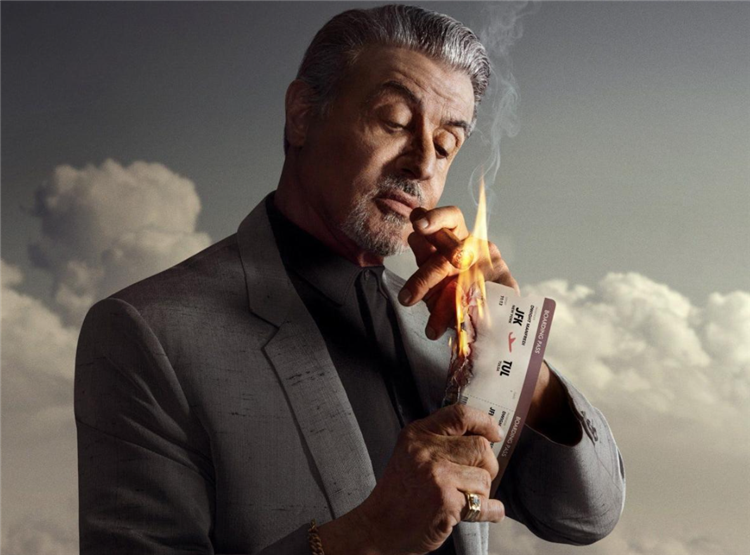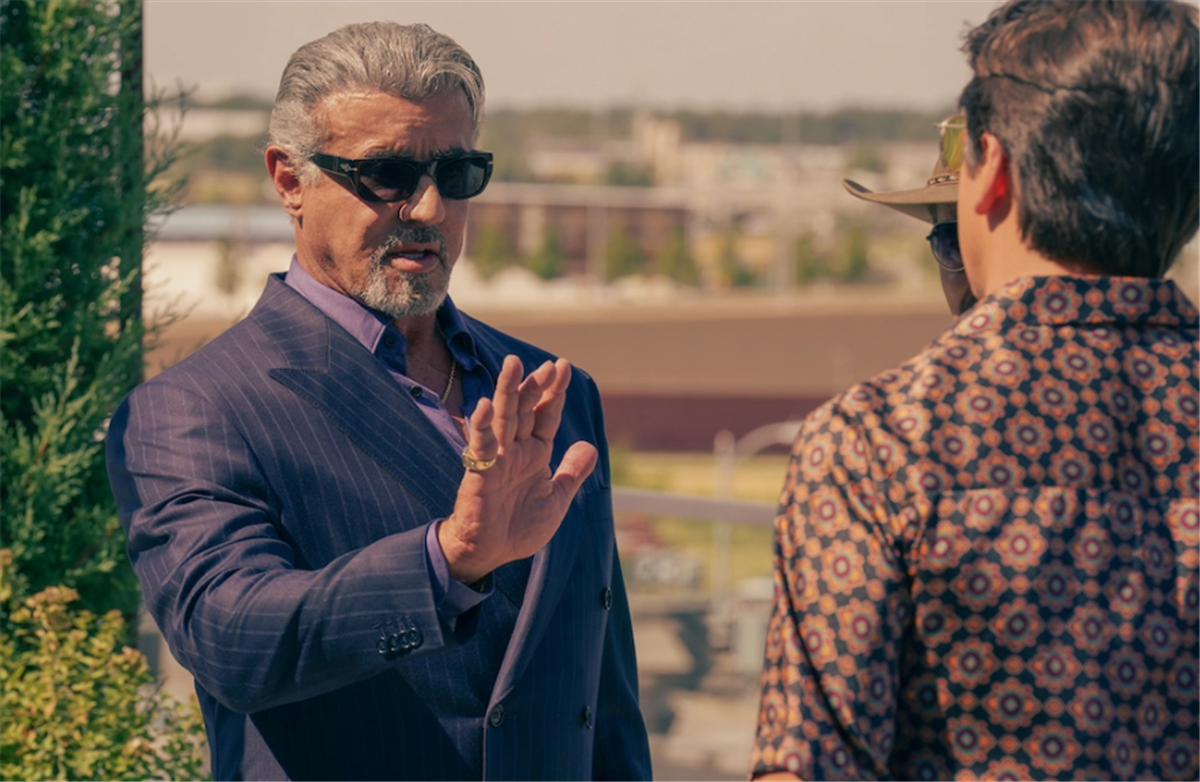A dual threat since “Rocky,” the executive producer and star of Paramount’s hit crime comedy often contributes on both sides of the camera. But, as he tells IndieWire, those days may be over.
Sylvester Stallone’s rise is a story so celebrated, it’s come to shape how we imagine the Hollywood dream. A young, no-name actor writes a script, sells it to a studio, fights to play the title role, and — for his effort, his faith, and his talent — the movie turns him into a star. More than a star, really. “Rocky” and the ensuing sequels helped establish Stallone as a multi-hyphenate artist. For nearly 50 years, Stallone has been writing, acting, producing, and directing many of his own projects.
But after his latest dual role — leading and executive producing the Paramount+ series “Tulsa King” — Stallone may be staying behind the camera on his future creative endeavors. When asked if he’s writing any passion projects to direct and star in, Stallone said, “I might, but maybe not the acting.” He mentioned “Poe,” the Edgar Allen Poe biopic he’s long sought to realize, as well as “Tenderloin,” a TV show he developed with “Yellowstone” director and executive producer Stephen Kay.
“But I doubt the acting aspect of it,” Stallone said. “I think this might be my swan song.”
If so, “Tulsa King” would make for a fitting, if by all appearances premature, goodbye. Created by Taylor Sheridan (though separate from his “Yellowstone” franchise), the freshman crime drama follows Dwight Manfredi, a mafia leader fresh out of prison, who’s exiled from New York and starts his own outfit in Tulsa. The 76-year-old Stallone is both No. 1 on the call sheet and an executive producer, but his showrunner and fellow castmembers all spoke to many uncredited contributions — and spoke highly.
“Look, with Sly, you’re getting an Academy Award nominated writer, a director, a producer, and an editor who also happens to be a great actor,” showrunner Terence Winter said. “You’d be foolish not to bring him into the process. It was really easy. It was a real collaboration.”
“Tulsa King” was customized for the star, like the fine Italian suits always donned by his character, Stallone kept tinkering with the part during production, as well as specific scenes, scripts, and the tone.
“I tried to make it as close to my personality as possible,” Stallone said of his “Tulsa King” role. “The idea is: They come up with an idea, a concept, but if you’re a writer, you know how to tailor things to your strengths and deflect your weaknesses. […] Terry [Winter] had that confidence in me.”
“It’s great when they’re good at it — when you’re with actors who can [write] well,” Winter said. “None of the changes [Stallone] suggested were born of, ‘This doesn’t make me look cool, I want to look cooler.’ It was all about: ‘This is right for the character.’ […] It was really refreshing to work with somebody who just cares about the material.”
Compared to past roles, Stallone said playing Dwight was “actually quite easy.”

“When you’re doing Rambo, after a while it’s like [groans] — you want to attack the pancakes in the morning, you want to throw your coffee against the wall, you actually breathe that kind of anger,” he said. “If you keep it going, it reflects in your eyes. So this one here was not bad at all.”
Maybe this job was “easy,” or maybe Hollywood’s sizeable challenges are just routine for Stallone. After five decades in the business (and three Oscar nominations), the man hasn’t exactly slowed down. He produced and starred in his latest film, “Samaritan,” which premiered a few months prior to “Tulsa King.” “The Expendables 4” — a franchise he started by writing an original script, directing the first film, and leading a large ensemble — is in post-production for a September 2023 release. After a run of duds in the late ’90s and early 2000s, he’s kept busy, and of the six “Tulsa King” cast members I spoke to, all six were taken aback by his work ethic.
“Nobody works harder than he does,” Dana Delaney said, who plays ranch owner Margaret Devareaux. “I think that’s what surprised me the most: that this guy, at this age, still wants to do it. He’s still curious, he’s still excited about it, he still knows everything that’s going on on the set, and he’s so present.”
“I wasn’t quite prepared for how dedicated he was — and how smart,” Max Casella said. “He’s made countless movies, and he’d [still] come in and know exactly what was going on. He could do everybody’s job.”
“His work ethic is fantastic,” Garrett Hedlund said. “He’s not phoning anything in. He’s coming at it from the perspective of not only the world’s hero or an icon, but as a director, a writer, an artist. He approaches everything [from] ‘How can we make this the best it can be?’ And that’s the best collaborator you can have.”
Hedlund has known Stallone since 2002, when the young actor walked into their shared gym and spotted the action star “climbing the ceiling rope with his legs jackknifed out.”
“He was always the sweetest. Supportive,” Hedlund said. “He always wondered what I was up to, what I was shooting, this and that. Working with him on this just felt right.”
“He’s gonna blow people’s minds,” Winter said. “Watching him do an entire page-and-a-half monologue — the entirety of the ‘Rambo’ series hasn’t had that many words put together in one run. People are going to be really pleasantly surprised at how funny he is.”
“Funny” isn’t a term often associated with Taylor Sheridan projects, but it absolutely applies to “Tulsa King.” Amid the mob fights and fractured families (Dwight spends the season trying to reconnect with his estranged daughter), humor is regularly infused to enliven each episode.
Winter recognized the inherent levity in the premise. “The fish-out-of-water stuff is like candy,” he said. “You take a New York mobster and put him in Tulsa, it’s already funny, you’re already chuckling.”
But rather than rely on the situation or supporting characters to supply the laughs (including cast members who are known for their jokes, like Andrea Savage and Martin Starr), Stallone conjures much of the comedy himself.
“It seems funny and natural because that’s what my real voice is,” Stallone said. “Before, [the series] was pretty droll, and we’ve seen droll. Droll has been done to death. It’s been done very well — De Niro and these guys have done ‘Casino’ and ‘Goodfellas’ — so let’s try to take this in a different direction.”
Stallone did just that in an early scene where Dwight reconnects with his his old mafia cohorts. Expecting a lavish “thank you” for serving 25 years behind bars to protect the organization, he’s told instead to leave town, leave his family, leave everything he knows, and move to the middle of nowhere.
“I redid the scene twice,” Stallone said. “The first time I come into the room with the mafia guys — and I never told anyone this — I was trying to play it more intellectual. He’s been in a prison, he’s well read, he’s reading Marcus Aurelius and philosophy, so he’s not going to let anyone get under his skin.”
But after one take, Stallone knew it wasn’t working.

“I said, ‘Woah, wait. This stinks.’ And we all looked at it, and it was terrible. It needed to have that anger, and I’ll tell you why: He walks out of there [thinking], ‘Huh, maybe Tulsa. Maybe I’ll breathe some fresh air.’ We leave him on an angry note, but the first thing that happens [when he gets off the plane in Tulsa] is he gets hit by a grasshopper in the chest. OK. Now we get it. Tulsa is going to be a little weird. It’s going to funny. That’s what took a little convincing to do.”
The anger Stallone mentioned not only resonates in the first scene, strengthening a key moment for Dwight, but it also magnifies the laugh in the second, which helps illustrate to viewers what they can expect from the series. Without being involved at the producer level, an actor may not be able to push for such changes, let alone anything more substantial. They may lack the authority, there may not be time, or both. The performance would have to adjust to what’s already been planned, and then audiences end up with the first, less productive take.
Of course, not all actors should be pitching story changes — like Winter said, such advice is only welcome when they’re good at it — but Stallone has proven over decades that he’s an exception. From “Rocky” through “Rocky IV,” into the first “Expendables” film, “Rocky Balboa,” and even “Rambo” (the fourth entry, which Stallone co-wrote and directed), many of his best starring roles spring from his passion for the part and the production itself. When reduced to an actor for hire, the overall quality is more mixed.
A primary example stems from his most popular franchise. Stallone wrote all six “Rocky” films and directed four. The two he didn’t helm were the first film — when, at the time, he lacked the experience and clout to direct — and the fifth, “Rocky V,” which performed so poorly it nearly killed the franchise. Explanations for its critical and box office drubbing range from misguided story choices (the film shifts focus to a new boxer, and Rocky never fights in the ring) to poor overall execution. (“Rocky V,” by all accounts, is a bad movie.) But in the 2011 Biography channel documentary “The Rocky Saga: Going the Distance,” Sylvester’s brother, Frank Stallone, boils down the movie’s collapse to a single choice.
“Every time you direct your own thing, it always works,” Frank recalls telling his brother. “Every time you try to bring someone else in because you want to go out and play golf, it doesn’t work.”
While a bit flippant (in the way brothers can be), his point remains: Sylvester Stallone the actor is often better off working with Sylvester Stallone the writer, director, and producer. “Tulsa King” makes clear each version can keep punching well into the future — if he so chooses.
